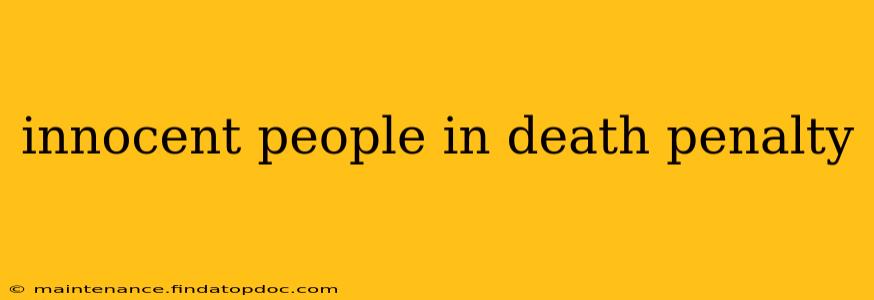The death penalty, a practice steeped in history and controversy, carries with it the chilling possibility of executing innocent individuals. While proponents argue for its deterrent effect and retributive justice, the irreversible nature of capital punishment necessitates a meticulous examination of its potential for fatal errors. The execution of innocent people represents a catastrophic failure of the justice system, a stain on the conscience of any nation that employs it.
This article explores the unsettling truth of wrongful convictions leading to executions, examining the contributing factors, the consequences, and the ongoing debate surrounding this deeply troubling aspect of capital punishment.
How Do Innocent People Get Sentenced to Death?
The journey from wrongful conviction to execution is often a complex and heartbreaking process. Several factors contribute to this devastating outcome:
-
Eyewitness Misidentification: Mistaken eyewitness testimony remains a leading cause of wrongful convictions. Stress, fear, and the suggestibility of memory can lead to inaccurate identifications, even with the best intentions. These flawed identifications can be powerfully persuasive in court, especially when coupled with other circumstantial evidence.
-
False Confessions: Coerced or false confessions, often obtained through psychological manipulation or outright brutality, can irrevocably damage a case. Vulnerable individuals, those with intellectual disabilities, or those subjected to intense interrogation techniques are particularly at risk.
-
Ineffective Legal Counsel: Inadequate representation can severely undermine a defendant's chances of a fair trial. Underfunded or overworked public defenders may lack the resources or expertise to thoroughly investigate a case, challenge evidence effectively, or present a compelling defense.
-
Prosecutorial Misconduct: Cases have been overturned due to prosecutorial misconduct, which might include withholding exculpatory evidence or presenting false testimony. The pursuit of conviction, sometimes fueled by political pressures or ambition, can override the pursuit of justice.
-
Faulty Forensic Science: The reliability of forensic science, long considered a pillar of the justice system, has come under increasing scrutiny. Techniques previously considered infallible, such as bite-mark analysis or microscopic hair comparison, have been shown to be prone to error and bias.
What Happens After an Execution of an Innocent Person?
The execution of an innocent individual is an irreversible tragedy with profound consequences:
-
Loss of Life: The most immediate and devastating consequence is the irrevocable loss of an innocent human life. This loss affects not only the victim but their family, friends, and community.
-
Erosion of Public Trust: The execution of an innocent person fundamentally undermines public trust in the justice system. It raises serious questions about the fairness and integrity of the legal process, potentially leading to public skepticism and cynicism.
-
Moral Reproach: Internationally, the execution of an innocent person brings significant moral reproach on a nation. It highlights the failings of the system and can damage a country's reputation on the world stage.
-
Legal Challenges and Reforms: Such cases often spur intense legal battles, leading to reviews of legal processes, forensic practices, and the very structure of the death penalty itself.
How Many Innocent People Have Been Executed?
Determining the precise number of innocent people executed remains a complex task. While there is no definitive global database, numerous documented cases illustrate the horrific potential for error in capital punishment systems. Organizations like the Innocence Project dedicate significant resources to uncovering and rectifying these miscarriages of justice, showcasing the chilling reality that innocent people have been executed. The lack of a complete record underscores the gravity of the problem and highlights the need for ongoing reform.
What are the Arguments Against the Death Penalty?
The possibility of executing innocent individuals serves as a powerful argument against capital punishment. Many find it morally reprehensible to inflict an irreversible punishment on someone who may be wrongly convicted. The risk of error, however small, is deemed unacceptable when a human life hangs in the balance. The high cost of death penalty trials, compared to life imprisonment, is another significant counterargument. The focus should be on upholding justice and ensuring that no innocent person is condemned to death.
Can the Death Penalty System be Improved to Prevent Future Executions of Innocent People?
Improving the death penalty system to eliminate the risk of executing innocent people is a complex and challenging undertaking. Several reforms have been proposed, including:
- Strengthening forensic science techniques: Ensuring the accuracy and reliability of forensic evidence is crucial.
- Improving legal representation: Providing adequate funding and resources for all defendants, especially those facing capital charges.
- Implementing stricter standards for eyewitness testimony: Developing methods to reduce the likelihood of mistaken identifications.
- Expanding access to DNA testing: Allowing for post-conviction DNA testing can potentially overturn wrongful convictions.
- Implementing mandatory appeals processes: This ensures that cases are thoroughly reviewed at every stage.
Ultimately, the question of whether the death penalty can truly be made error-free remains a subject of intense debate. Many argue that the inherent risks and the potential for irreversible injustice outweigh any perceived benefits.
The execution of innocent people serves as a stark reminder of the fallibility of the justice system and the devastating consequences of irreversible punishment. The ongoing debate surrounding capital punishment must acknowledge this tragic reality and prioritize the pursuit of justice over the pursuit of retribution.
